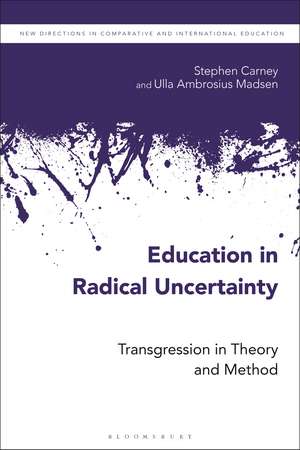Education in Radical Uncertainty: Transgression in Theory and Method: New Directions in Comparative and International Education
Autor Stephen Carney, Ulla Ambrosius Madsenen Limba Engleză Paperback – 22 mar 2023
| Toate formatele și edițiile | Preț | Express |
|---|---|---|
| Paperback (1) | 193.07 lei 6-8 săpt. | +73.61 lei 6-12 zile |
| Bloomsbury Publishing – 22 mar 2023 | 193.07 lei 6-8 săpt. | +73.61 lei 6-12 zile |
| Hardback (1) | 599.82 lei 6-8 săpt. | |
| Bloomsbury Publishing – 8 sep 2021 | 599.82 lei 6-8 săpt. |
Preț: 193.07 lei
Preț vechi: 250.30 lei
-23% Nou
Puncte Express: 290
Preț estimativ în valută:
36.95€ • 38.28$ • 30.84£
36.95€ • 38.28$ • 30.84£
Carte tipărită la comandă
Livrare economică 21 martie-04 aprilie
Livrare express 13-19 februarie pentru 83.60 lei
Preluare comenzi: 021 569.72.76
Specificații
ISBN-13: 9781350216778
ISBN-10: 1350216771
Pagini: 304
Ilustrații: 31 bw illus
Dimensiuni: 156 x 234 x 25 mm
Greutate: 0.43 kg
Editura: Bloomsbury Publishing
Colecția Bloomsbury Academic
Seria New Directions in Comparative and International Education
Locul publicării:London, United Kingdom
ISBN-10: 1350216771
Pagini: 304
Ilustrații: 31 bw illus
Dimensiuni: 156 x 234 x 25 mm
Greutate: 0.43 kg
Editura: Bloomsbury Publishing
Colecția Bloomsbury Academic
Seria New Directions in Comparative and International Education
Locul publicării:London, United Kingdom
Caracteristici
Contains an innovative empirical core made up of data excerpts (interviews, observations, field notes, photos and artefacts) as well as images that aim to inspire and provoke the reader
Notă biografică
Stephen Carney is Professor of Educational Studies at Roskilde University, Denmark. His research focuses on global educational reform and has involved ethnographic work in Denmark, England, Nepal and China. He is active in the Comparative and International Education Society (CIES), especially its Special Interest Group concerned with 'Post-foundational approaches to comparative and international education'. He is also a member of Executive Committee of the Comparative Education Society of Europe (CESE). Ulla Ambrosius Madsen is Associate Professor of Educational Studies at Roskilde University, Denmark. She has carried out extensive field work in Mongolia, Eritrea, Nepal, South Korea, Zambia and Denmark with a focus on schooling and youth, research methodology and philosophy of education. She has written widely on these themes, especially in relation to the work of Jean Baudrillard.
Cuprins
List of IllustrationsAcknowledgementsSeries Editors' ForewordIntroduction: By Way of Explanation1. A Thousand and One Disturbing Little Stories2. Education in/and the Global3. Into the Darkness4. Writing as MethodIn Extremis5. A World in/of Fragments6. Comparative Education and Radical UncertaintyNotesReferencesIndex
Recenzii
This is a courageous book that will make readers think differently about educational research. Carney and Madsen present a profound epistemological argument for alternative ways of doing research, and they also actually do it. Aesthetically curated, juxtaposed, designed in poetic forms and complemented by drawings and sketches, little stories lead to an extremely coherent portrait of the complex world of schooled life in three sites. A must read!
Once in a while a comparative and international education book emerges that is a startling breath of fresh air. Education in Radial Uncertainty is such a book. Using fragmented writing, the authors have produced a readerly text that pushes us to question our understandings of contemporary education in unapologetically transgressive and affirmative ways.
Uninspired by status-quo social science? Unable to shake uncertainty but hesitant to surrender to the unknowable? Carney and Madsen draw upon decades of collaboration to deliver a profound riddle for contemporary educational research. With each turning page, this 21st century koan seeps in, all written with enough subtle humor and sparkle to suggest that the abyss is gazing back into us with a smile.
Education in Radical Uncertainty is written with intense love, passion, and pain. It calls on each of us to face the world the way it is - finite, fractured, and fragmented - refusing the delusional pursuit of (re)making it the way we want it.
Education in Radical Uncertainty is a book that questions the most profound scientific project of sense-making. It speaks to the insight that we all share from time to time that maybe the world is not organized with the rational logic that we feel compelled to impose upon it. Perhaps the world makes no sense. And although this might cause us to despair at first, it might also be a relief. Personally, I learned much and enjoyed reading it. It has made me think differently about my own research. What else can you ask from a mere book?
Once in a while a comparative and international education book emerges that is a startling breath of fresh air. Education in Radial Uncertainty is such a book. Using fragmented writing, the authors have produced a readerly text that pushes us to question our understandings of contemporary education in unapologetically transgressive and affirmative ways.
Uninspired by status-quo social science? Unable to shake uncertainty but hesitant to surrender to the unknowable? Carney and Madsen draw upon decades of collaboration to deliver a profound riddle for contemporary educational research. With each turning page, this 21st century koan seeps in, all written with enough subtle humor and sparkle to suggest that the abyss is gazing back into us with a smile.
Education in Radical Uncertainty is written with intense love, passion, and pain. It calls on each of us to face the world the way it is - finite, fractured, and fragmented - refusing the delusional pursuit of (re)making it the way we want it.
Education in Radical Uncertainty is a book that questions the most profound scientific project of sense-making. It speaks to the insight that we all share from time to time that maybe the world is not organized with the rational logic that we feel compelled to impose upon it. Perhaps the world makes no sense. And although this might cause us to despair at first, it might also be a relief. Personally, I learned much and enjoyed reading it. It has made me think differently about my own research. What else can you ask from a mere book?






